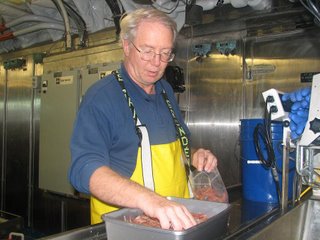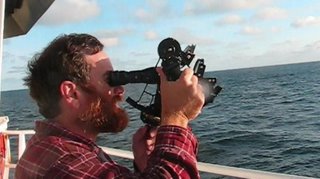
Wednesday, October 15, 2008
A Changing Ecosystem
 Our study of creatures on the bottom of the sea has been done every year for 45 years. In fact, it is the longest series of data for fish, in the world. Why is this important? I asked Dr. Michael Fogarty, head of the Ecosystems Assessment Program, at the Northeast Fisheries Sciences Center in Woods Hole, MA.
Our study of creatures on the bottom of the sea has been done every year for 45 years. In fact, it is the longest series of data for fish, in the world. Why is this important? I asked Dr. Michael Fogarty, head of the Ecosystems Assessment Program, at the Northeast Fisheries Sciences Center in Woods Hole, MA.Mr. T: What does that mean in terms of the ecosystem?
- Overfishing
- Destructive Fishing Practices
- Climate Change
- Ocean Acidification
- Plastic Trash in the Water
- Runoff Pollution

Remember the other day when I tried to use a sextant to fix our position? I could not even get close, so today, I took a lesson with one of the NOAA Corps officers on board, Lieutenant Junior Grade Andrew Seaman. Click here to come along.
Elsewhere on the ship, Snuggy and Zee paid a visit to the dive locker on the ship. This is the area on the ship where SCUBA gear is stored. We are not using SCUBA on this trip, but it was fun to visit the locker and see all the gear. Snuggy and Zee learned that the crew can actually fill up the air bottles they need right on the ship. They have all the equipment they need to do work underwater right here on the ship.
--------------------------
AT: I have not been frightened by anything on the ship or in the sea that we have seen. The hag-fish did seem gross. Very gross. Other than that, no.
Hi SP, I enjoy Korean food very much and have eaten lots of crab roe. It does not gross me out at all. Thanks for writing.
NV, Zee and Snuggy are just fine. Thanks for asking.
Mrs. B's Class: I'm glad you liked the blog. We found the dead whale 100 miles or so off of Cape Cod. There are no sea snakes here. The water is too cold. I'm kind of glad about that!
Hello Mrs. Graham's Class. I am staying nice and warm. Even working on deck, it is not too cold. We could stay out for several more weeks without a problem. Do you know what we use to make electricity? See if you can figure that out. We have to go back to port before we run out of that.
Mrs. Christie Blick's Class: Very interesting. Our chief Scientists says that they can tell the whales don't like barnicles because whales without them don't behave in quite the same way.
This particular fish, which we call a monk fish or a goose fish has all the adaptations you mentioned. You did very well thinking those up. The Chief Scientist, Phil Politis and I are both impressed. He says that the fish hides in the mud (that is why it is brown), which keeps it hidden from predators. It has another adaptation, the illicium which we are calling a fishing rod. This adaptation lures smaller fish to the monkfish. Since it does not move around as much as many other fish, it can stay safer from predators.
Hello to Mrs. Coughlin's Class, Mrs. Berubi's Class. I'm glad you like the blog.
NN, I'll be back next week. Because the crew and I, as well as a few birds are the only land-creatures we have seen out this far! Thanks for writing.
Hi Jennnifer. Thanks for your kind words and thanks for checking in on the blog.







